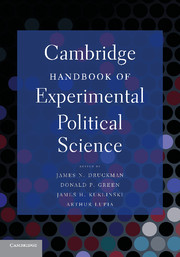Book contents
- Frontmatter
- Contents
- List of Tables
- List of Figures
- Contributors
- Acknowledgments
- INTRODUCTION
- 1 Experimentation in Political Science
- PART I DESIGNING EXPERIMENTS
- PART II THE DEVELOPMENT OF EXPERIMENTS IN POLITICAL SCIENCE
- PART III DECISION MAKING
- PART IV VOTE CHOICE, CANDIDATE EVALUATIONS, AND TURNOUT
- PART V INTERPERSONAL RELATIONS
- PART VI IDENTITY, ETHNICITY, AND POLITICS
- PART VII INSTITUTIONS AND BEHAVIOR
- PART VIII ELITE BARGAINING
- PART IX ADVANCED EXPERIMENTAL METHODS
- AFTERWORD
- Name Index
- Subject Index
- References
1 - Experimentation in Political Science
Published online by Cambridge University Press: 05 June 2012
- Frontmatter
- Contents
- List of Tables
- List of Figures
- Contributors
- Acknowledgments
- INTRODUCTION
- 1 Experimentation in Political Science
- PART I DESIGNING EXPERIMENTS
- PART II THE DEVELOPMENT OF EXPERIMENTS IN POLITICAL SCIENCE
- PART III DECISION MAKING
- PART IV VOTE CHOICE, CANDIDATE EVALUATIONS, AND TURNOUT
- PART V INTERPERSONAL RELATIONS
- PART VI IDENTITY, ETHNICITY, AND POLITICS
- PART VII INSTITUTIONS AND BEHAVIOR
- PART VIII ELITE BARGAINING
- PART IX ADVANCED EXPERIMENTAL METHODS
- AFTERWORD
- Name Index
- Subject Index
- References
Summary
In his 1909 American Political Science Association presidential address, A. Lawrence Lowell (1910) advised the fledgling discipline against following the model of the natural sciences: “We are limited by the impossibility of experiment. Politics is an observational, not an experimental science…” (7). The lopsided ratio of observational to experimental studies in political science, over the one hundred years since Lowell's statement, arguably affirms his assessment. The next hundred years are likely to be different. The number and influence of experimental studies are growing rapidly as political scientists discover ways of using experimental techniques to illuminate political phenomena.
The growing interest in experimentation reflects the increasing value that the discipline places on causal inference and empirically guided theoretical refinement. Experiments facilitate causal inference through the transparency and content of their procedures, most notably the random assignment of observations (a.k.a. subjects or experimental participants) to treatment and control groups. Experiments also guide theoretical development by providing a means for pinpointing the effects of institutional rules, preference configurations, and other contextual factors that might be difficult to assess using other forms of inference. Most of all, experiments guide theory by providing stubborn facts – that is, reliable information about cause and effect that inspires and constrains theory.
- Type
- Chapter
- Information
- Cambridge Handbook of Experimental Political Science , pp. 3 - 12Publisher: Cambridge University PressPrint publication year: 2011
References
- 23
- Cited by

